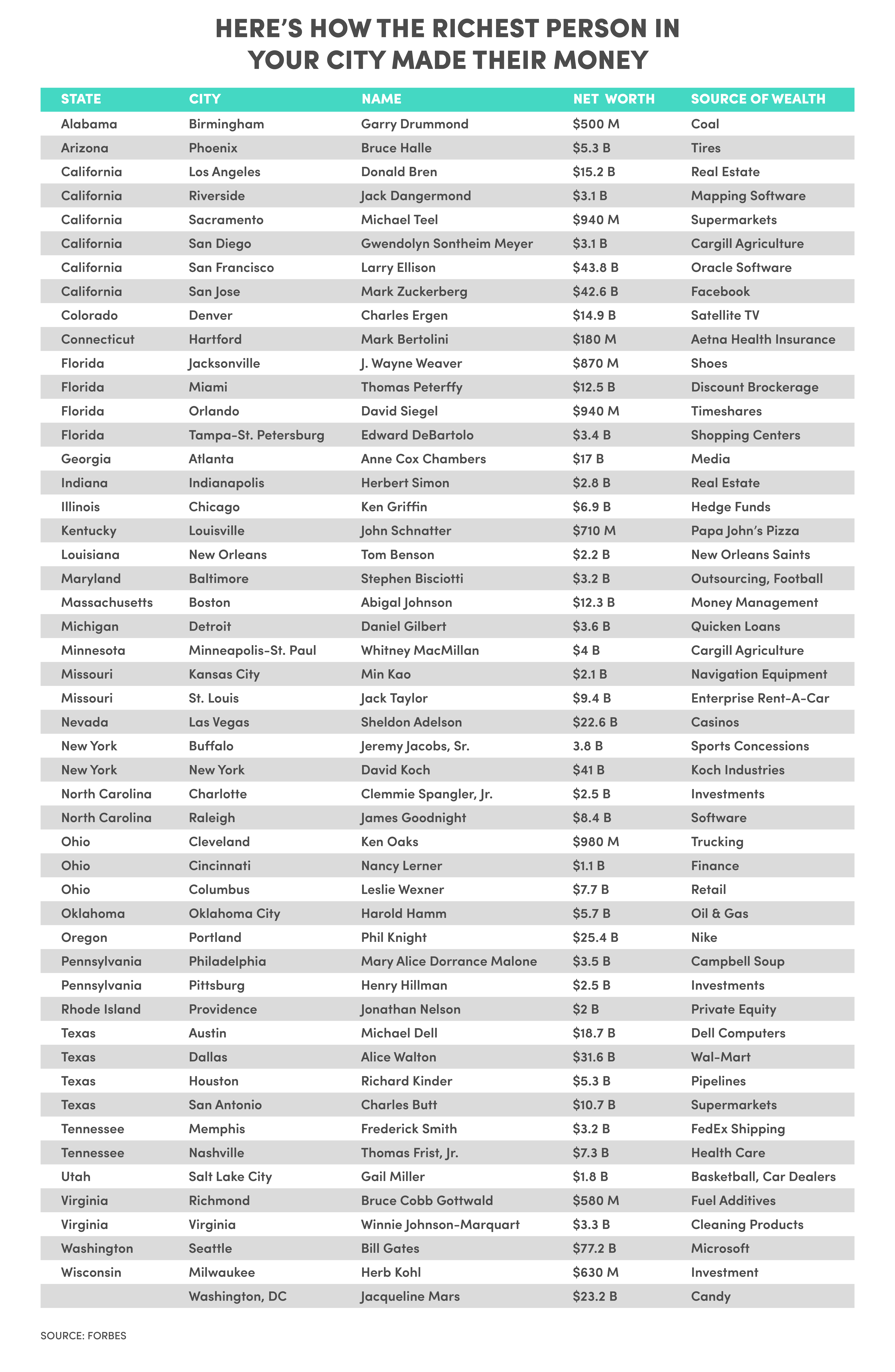How The Richest Person in Your City Made Their Money

By:
What do candy and pipelines have in common? These are just a couple of ways the richest people in the country made their money.
From Atlanta to Washington D.C., Forbes has found the richest person in America's 50 largest cities — and none of them are celebrities or athletes.
Here were the five most interesting ways people made their fortune.
1. Candy
Jacqueline Mars; Washington, DC; $23.2 B
Americans have a sweet tooth. As an heiress to Mars Inc., Jacqueline Mars probably knows this better than anybody. Mars bars, Milky Way bars, M&M's, Skittles, Snickers, and Twix all fall under the Mars Inc. umbrella. According to the U.S. Census Bureau, the average American consumes "about 22 pounds of candy year round." That's a lot of sugar, especially considering the other places it's hidden. As the New York Times reports, studies have linked sugar with obesity and heart disease (even though the sugar industry places the blame on fat).
2. Diversification
David Koch; New York, NY; $41 B
David Koch is one of the richest men in the world and is one-half of "the Koch Brothers," along with his brother Charles. Together, they've been dubbed the "financiers of the radical right," key players in bankrolling right-wing political action groups, think tanks, and individual politicians, using this array of political power to advance their ideological agenda of limited government and less regulation," the Center for American Progress writes.
So where exactly does their wealth and power come from? As ATTN: previously reported, "Their wealth derives from a vast network of businesses and subsidiaries under the umbrella 'Koch Industries,' an oil and gas conglomerate which the brothers refer to as 'the biggest company you’ve never heard of.' Koch Industries operates in 45 states and over 60 countries; along with fossil fuels, it is involved in commodities trading, agriculture, and timber."
3. Outsourcing
Stephen Bisciotti; $3.2 B; Baltimore, MD
In addition to being the majority owner of the NFL team, the Baltimore Ravens, Bisciotti founded Allegis Group, the largest privately held staffing firm in America, that provides outsourced IT services along with other recruiting services, reports the Times. By his critics, Bisciotti's endeavors have been described as "a monument to the exploitation of corporate greed" which "exists and thrives because of the modern boardroom addiction to downsizing, outsourcing and otherwise hiring fewer employees and paying them less," The Baltimore Sun reported in 1999.
Outsourcing has been a hot-button topic in the 2016 presidential campaign and the target of growing resentment from Americans. As ATTN: has written, outsourcing is a major factor in why companies are paying their employees less: "Since more and more corporations have embraced outsourcing, college graduates have lost salary bargaining power, and we've also seen a vastly growing number of college graduates in minimum wage jobs which have doubled from 2007 to 2012."
4. Pipelines
Richard Kinder; $5.3 B; Houston, TX
Pipelines have been in the news recently. Native Americans and environmentalists are protesting the Dakota Access Pipeline, a project by Energy Transfer Partners, deeming it a threat to sacred sites and nature. While Richard Kinder, co-founder and executive chairman of Kinder Morgan Energy Partners, does not own the company behind that project, his company has entered a joint venture with Energy Transfer Partners before.
Anne Helen Peterson at Buzzfeed wrote about how the fight against the DAPL has sparked a wider, essential conversation around the rights of tribes and environmental justice: "The thousands at Sacred Stone Camp are here to protect the water, but they’re also here to protest: the systematic mistreatment of Native Americans by the American government, the impunity of big business when it comes to leaks, spills, contaminations, and other unintended but often ignored side effects of making money in America."
5. Satellite TV
Charles Ergen; $14.9 B; Denver, CO
To cord-cutting millennials, this might be shocking. But yes, it's true — people still watch satellite television. According to the J.D. Power 2016 Streaming Video Satisfaction Study: "Overall satisfaction with paid streaming video service is highest among customers who subscribe to a traditional cable/satellite service in addition to streaming video service."
And there might be more customers coming down the pipeline. The Times reports: "The decision to go without a traditional cable or satellite service and rely exclusively on Internet streaming video might last only until millennials start families, new Nielsen research on the media habits of the 18-to-34 age group suggests."

